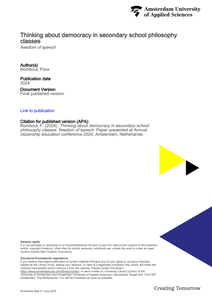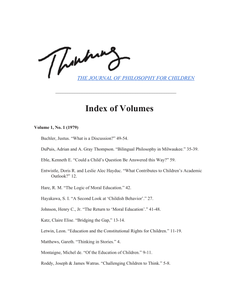Philosophy is an elective subject in secondary education in the Netherlands, which is not often studied in the context of citizenship education. This is probably because only a minority of students participate in philosophy classes in the upper grades of secondary education (approximately 2-5% of all students). However, especially in the years 2022-2025 philosophy is particularly interesting for those studying how citizenship education can be taught, because the higher general track students study a range of philosophical ideas about democracy for their final exams (Spoelstra et al., 2021).This paper presents a qualitative analysis of three philosophy classes about freedom of speech. The lesson transcripts, pre- and post-observation interviews with 3 teachers and 15 students (5 from each class) are coded thematically with a framework for four teacher responsibilities during philosophical discussion in moral education. These four responsibilities are: teachers have an organizational responsibility to facilitate lesson activities such as classroom dialogue to facilitate thinking about democracy, an epistemic responsibility to warrant valid reasoning and recognition of established facts during the lesson, a pedagogic responsibility to create a safe and open classroom climate and a moral responsibility to find the right balance between value communication and stimulation (Leenders & Veugelers, 2004; Rombout et al., 2022; Sprod, 2001). The main research question was: how do philosophy teachers realize these four responsibilities to facilitate their students’ thinking about democracy in a lesson about freedom of speech and how to teacher and students evaluate these responsibilities in this lesson?The findings contain rich descriptions of lesson activities such as considering borderline cases, facilitating teacher-led dialogue, organizing debate, and learning about philosophers’ arguments. These are supplemented with reflections of the participants on teacher neutrality and how open and safe the classroom climate was during these lessons.
DOCUMENT

The journal was a forum for the work of both theorists and practitioners of philosophical practice with children, and published such work in all forms, including philosophical argument and reflection, classroom transcripts, curricula, empirical research, and reports from the field. The journal also maintained a tradition in publishing articles in the hermeneutics of childhood, a field of intersecting disciplines including cultural studies, social history, philosophy, art, literature and psychoanalysis.
DOCUMENT

In secondary school philosophy classes students learn to reason critically about social and scientific issues. This study examined the effects of a whole-class, teacher-led philosophy classroom dialogue intervention on students’ value-loaded critical thinking. Value-loaded critical thinking is logically consistent, self-reflective reasoning focused on making moral value-judgments about what is right to believe or do. In a quasi-experimental study (N = 437 students) with a pre-test post-test design, we investigated whether engaging in classroom dialogues in which the teachers implemented five design principles for promoting value-loaded critical thinking and transfer thereof, positively affected students’ (n = 150) value-loaded critical thinking in transfer tasks. The results were compared to two comparison conditions: students (n = 149) who participated in regular teacher-led philosophy classroom dialogues and students (n = 145) who followed a regular 10th-grade curriculum without philosophy classes. Results showed that students in the intervention condition outperformed students in both comparison conditions on referring to moral values. Regarding critical reasoning, we only found significant effects compared to the students who followed the regular 10th-grade curriculum. Findings indicate that a specifically designed dialogic intervention can enhance students’ capacities in value-loaded critical thinking.
DOCUMENT

Within the framework of the “Greening Games” project, we will develop, test and distribute flagship didactic materials addressing the interdisciplinary nature of green digital gaming. These will be tested in selected higher education programs and finally shared as open access content for the broader academic and teaching community. It is our core strategic responsibility to educate students about the relations between digital games and environment. We believe that the more aware students of today will become greener game designers, programmers, and academic leaders of tomorrow. At the centre of our partnership’s didactic philosophy are human responsibility, ethical game design and sustainable gaming culture. Societal IssueVideo games serve as technological marvels and cultural reflections. McKenzie Wark suggests they are integral to a shared culture, fostering critical thinking. Games act as arenas for cultural values and environmental awareness. Climate-aware video games, often referred to as 'green games' or 'eco-games,' raise ecological consciousness and reconnect players with nature. For example, Riders Republic, which replicates real-world terrain using satellite imagery, inspires eco-awareness. However, the environmental footprint of video games, reliant on digital electronics and resource-intensive consoles, poses challenges. Developers, manufacturers, and gaming giants must address these impacts. Benjamin Abraham emphasizes sustainable game development as a holistic solution beyond incorporating green content.Benefit to societyBy developing teaching materials on green gaming for higher education, we create the following impact. We will…- increase the awareness of this subject among Bachelor’s and Master’s students.- enhance students’ knowledge of green gaming and their ability to integrate existing solutions into their game projects.- stimulate more research interest among research staff as well as students.- facilitate the uptake of pedagogical resources on green gaming by lecturers and professors.- create a European research community around the topic.- raise the visibility of green game studies among the game industry and wider public.